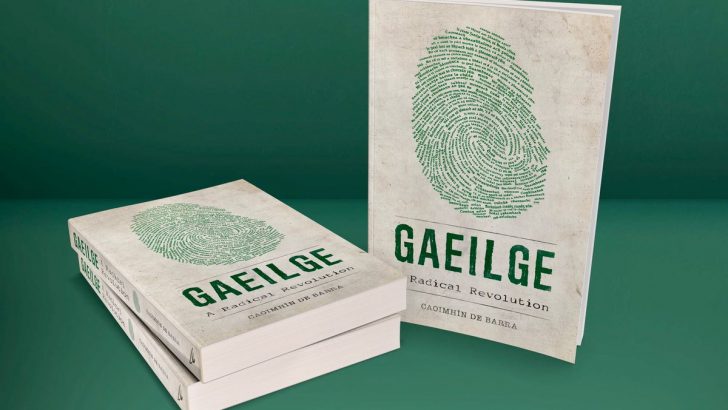Gaeilge: A Radical Revolution
by Caoimín De Barra (Currach Press, €14.99)
This is an interesting polemic which argues that Irish should and could be restored as the generally spoken language of most people in the Republic of Ireland.
In the introduction the author acknowledges that most people have already made up their minds on this issue. However, he forges ahead with his thesis.
He begins with his experience learning Irish. He rates the teaching of the subject at the schools he attended in Cork – Cloghroe National School and Christian Brothers College – as satisfactory. Yet when he ended his secondary education his knowledge of Irish was unsatisfactory. However, it was the opposite with regard to other subjects, particularly English and History. Significantly he notes that his father had frequently impressed upon him the importance of English and that he and his father shared a keen interest in Irish history.
De Barra sets out the main stages in the decline of Irish. The 17th Century saw the linguistic balance of power in Ireland shift sharply in favour of English as a result of political developments. The battle of Kinsale in 1601 marked the end of the independent Gaelic lordships and the Irish-speaking elite that had held sway over the island.
The Cromwellian campaign of the 1650s and the Williamite wars later in the century brought about a massive land transfer from the native Irish to settlers from England and Scotland.
The Irish who managed to keep their lands found it politic to speak English rather than Irish. But the Great Famine (1845-49) was arguably the primary reason for the decline of Irish. Within six years one third of the Irish-speaking world had vanished – these speakers had either died or fled overseas.
Efforts were made by the independent Irish State to promote the language. In 1919 the first Dáil Éireann made it clear that the revival of Irish was one of its priorities. It declared Irish to be the ‘first official language’ and it was made compulsory in primary and secondary schools. Also, in most schools other subjects were taught through the medium of Irish. Arrangements were made whereby all government business could be conducted in the vernacular.
Fluency
There were many other incentives, including a wide range of scholarships, to promote the language. The results are not encouraging. According to the 2016 census just under 40% of Irish people claimed to be able to speak the language. But experts question the level of fluency with which they are able to do so. A more realistic figure about the health of the language is that just 1.7% of the population are daily speakers of Irish.
De Barra discusses the challenges faced by other minority languages. He describes the travails of these promoting Welsh in Wales, Scots-Gaelic in Scotland, French in Canada and Spanish in the US. Yet Israel made Hebrew – a dead language- the State’s official and generally spoken language. And Bahasa was successfully established as the official language across the hundreds of islands that constitute Indonesia (though this is not such a good example as it is an example of Javanese internal colonialism over minority groups).
The author rightly says that the main reason why Irish people do not speak Irish is because they have no need to do so. Thus to have Irish spoken more generally a situation has to be created where it is necessary to speak it.
To this end he suggests a radical transformation of the government bureaucracy, whereby all its business would be conducted in Irish with only exceptional arrangements for those who wish to access its services in English.
In theory this could lead to more Irish being spoken, but in reality it is most unlikely that it will ever be realised. The Irish electorate would have none of this.
Internet
The internet and the world wide web have sounded the death knell for many minority languages across the world. Some are extinct. The aphorism tír gan teanga, tír gan anam is a truism.
Hence it is incumbent on all who love the language to be strongly supportive of the Irish language enthusiasts who are diligent in ensuring that this crucially important element of our national heritage is not lost.



